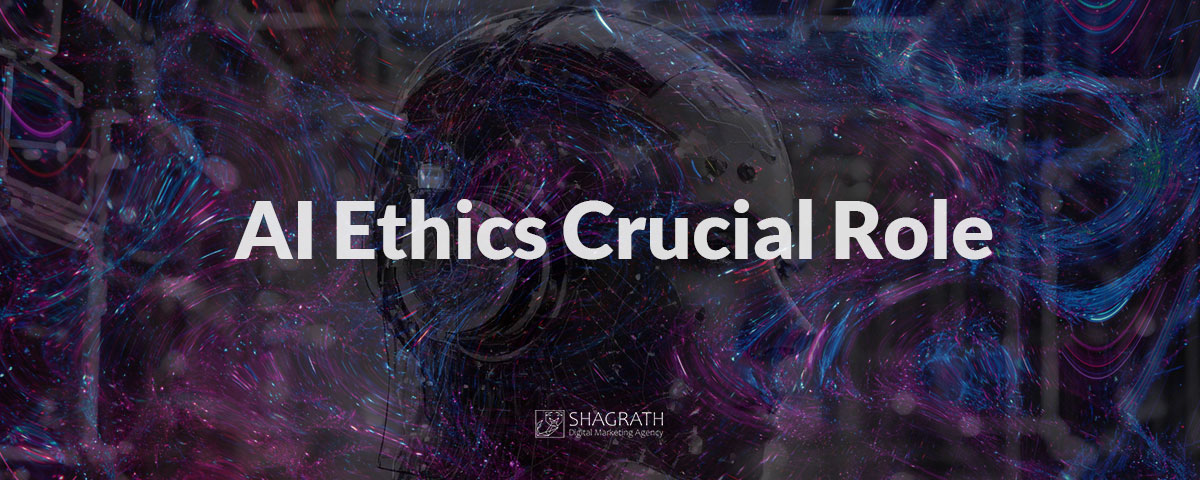
Digital Marketing Agency Management Game
March 30, 2024
From likes to Leads: User Generated Content (UGC)
May 11, 2024AI Ethics Crucial Role

AI ethics is a set of moral principles and practices guiding the development and application of AI technology. It focuses on maximizing impact while minimizing risks. UNESCO issued the first global AI ethics standard in November 2021. As AI advances, businesses should expect increased government regulation.

The 2023 State of Social Media: AI and Data Take Center Stage report shows that businesses are investing in AI, but responsible use is critical for long-term success. AI can boost performance, but misuse can have negative consequences such as a tarnished brand reputation, product failures, litigation, and regulatory problems. Understanding these issues is critical to maintaining ethical standards.
AI Ethics Issues for Marketers

In the tech sector, there are several ethical questions surrounding AI, including but not exclusive to the following:
• False content generation
• Explainability
• Societal impact
• Technology misuse
• Bias
• Data responsibility and privacy
• Fairness
• Robustness
• Transparency
• Environmental sustainability
• Diversity and inclusion
• Moral agency and value alignment
• Trust and accountability
AI can promote inclusivity and reduce biases by ensuring fair decision-making processes. However, ethical considerations including frameworks and regulations are crucial for responsible use. The Arboretum community forum highlights the potential for AI to shape a future where AI is a positive force of change, but also risks such as privacy infringement and manipulation.
AI and Digital Marketing Intersection

AI, which performs tasks such as learning and decision-making, is increasingly being used in digital marketing to analyze consumer data and deliver targeted advertisements and personalized experiences. However, ethical considerations arise as a result of the massive amount of data collected, stored, and processed. Marketers must be transparent about data collection practices and give consumers control over their data.
AI algorithms can reinforce biases if trained on biased data, leading to discriminatory outcomes.
Marketers must ensure fairness and unbiasedness in AI systems. AI-generated content, while useful, raises authenticity and credibility concerns. Marketers must be transparent about using AI-generated content and label it accordingly to maintain brand trust. AI advancements in digital marketing may automate job roles, potentially leading to job losses and economic inequality. Marketers must reskill and adapt to the changing landscape. AI can provide insights into consumer behavior, automate repetitive tasks, and enhance customer service through chatbots. However, it must be done responsibly and ethically.
The Digital Marketing Industry’s AI Ethics Landscape

Artificial intelligence (AI) has revolutionized digital marketing by enabling companies to create personalized customer experiences and targeted campaigns. AI-driven marketing relies on gathering and evaluating personal data, raising questions about surveillance and data exploitation.
AI in digital marketing has ethical implications beyond privacy and transparency. It can perpetuate biases and discrimination, as AI algorithms are trained on historical data. Marketers must address these biases to ensure fairness and inclusivity. Additionally, AI’s impact on employment and job displacement is crucial, as it may replace human workers, leading to job losses and economic inequality. Businesses must consider these social and economic implications to ensure a just transition for affected workers.
The proper handling of client data is a necessary component of the ethical application of AI in marketing. To prevent unauthorised access or exploitation of consumer information, businesses need to implement strong data protection procedures. This entails putting in place robust security measures, getting express consent before collecting data, and managing the personal information of clients. Although AI has enormous potential to improve digital marketing tactics, there are ethical issues that need to be resolved.
Regulation’s Function in AI and Digital Marketing

There aren’t many legal frameworks governing AI in marketing at the moment. The ethical concerns posed by AI are difficult for politicians to keep up with as technology progresses quickly. Some say that more regulation and control are necessary to safeguard consumer rights, while others worry that this will stifle innovation. Finding a balance is essential to making sure AI is used in marketing in an ethical manner. Protecting consumer privacy, maintaining openness, and stopping discriminatory activities should be the main goals of regulation. Marketers may handle ethical dilemmas with greater assurance if they have clear criteria, understanding that they follow moral principles.
Ethics to Be Considered by Marketers Using AI

An ethical marketing strategy must strike a balance between privacy and customisation. Marketers need to get the right consent and be open about how they acquire data. They should also give customers the means to control their privacy preferences. Another important factor to consider in AI marketing is ensuring impartiality and preventing bias. Like their creators, AI algorithms are not immune to bias. To ensure that all customers are treated fairly, marketers need to audit and test their AI algorithms on a regular basis to remove any potential biases.
Impact on Employment and Loss of Jobs

Researchers and experts are not concerned about technology singularity or AI surpassing human intelligence, but rather its limitations and potential job replacement ramifications. The goal of AI research is to save time and effort for more impactful tasks, like personalized shopping and social media scheduling. Sprout’s marketing team discusses AI usage in their Unread series, highlighting both benefits and fears.
Privacy Concerns
Brands are primarily concerned with issues related to data security, privacy, and protection. Businesses are placing a greater emphasis on security investments as a means of preventing chances for cyberattacks, hacking, and spying. In order to safeguard consumers and businesses, brands are putting best practices for data collection, storage, and analysis into practice as personalisation becomes popularity.
Discrimination and Bias in Algorithms

AI can exhibit bias against underrepresented data, as seen in cases of AI-generated artwork, chatbots, facial recognition software, algorithms, and hiring practices. For instance, TikTok and Twitter users criticized a thread featuring “#SouthSudan Barbie,” a negative stereotype associated with the region. This raises questions about how to combat bias and discrimination in AI training datasets.
Misinformation and Disinformation
AI, like us, isn’t flawless. There are worries that humans may spread false information with malevolent intent and that AI responses to prompts may not always be accurate. Disinformation risks can also result in brand crises and reputational harm, particularly if the right procedures and protections aren’t followed.
Intellectual Property and Copyright Issues

For creative tasks like outlining and brainstorming, AI is a great sparring partner. However, depending on how the outputs are used, AI may result in intellectual property breaches, plagiarism, and copyright infringement. For instance, in January 2023, a group of artists sued Midjourney and Stability AI, saying that the technologies violated the intellectual property rights of millions of artists. Although there is still much to learn about the legal ramifications of generative AI, establishing proactive guidelines and frameworks can assist reduce ethical hazards.
The Future of Ethical AI
As AI evolves, ethical guidelines for its use in marketing are crucial. Collaboration between marketers, industry experts, and regulatory bodies is needed to balance personalization, privacy, and transparency. By adhering to ethical standards, marketers can leverage AI’s capabilities and build consumer trust, positively impacting the digital marketing landscape. Understanding the intersection of AI and digital marketing is essential.

Artificial intelligence (AI) has evolved from a science fiction phenomenon to a technological cornerstone that exists right beneath our noses and has been developed over decades. Dreams of greater efficiency have come true thanks to AI, with many firms having already adopted AI marketing in the last few years. While excitement and enthusiasm have been generated, questions about the ethics of AI remain. The computer industry’s vision for the metaverse bore uncanny similarities to Snow Crash and Black Mirror, as did many of its innovations. And given the cultural zeitgeist surrounding books like Parable of the Sower, the Machine, and I, Robot, it makes sense why scientists, engineers, and sci-fi enthusiasts all caution against disregarding AI ethics.




